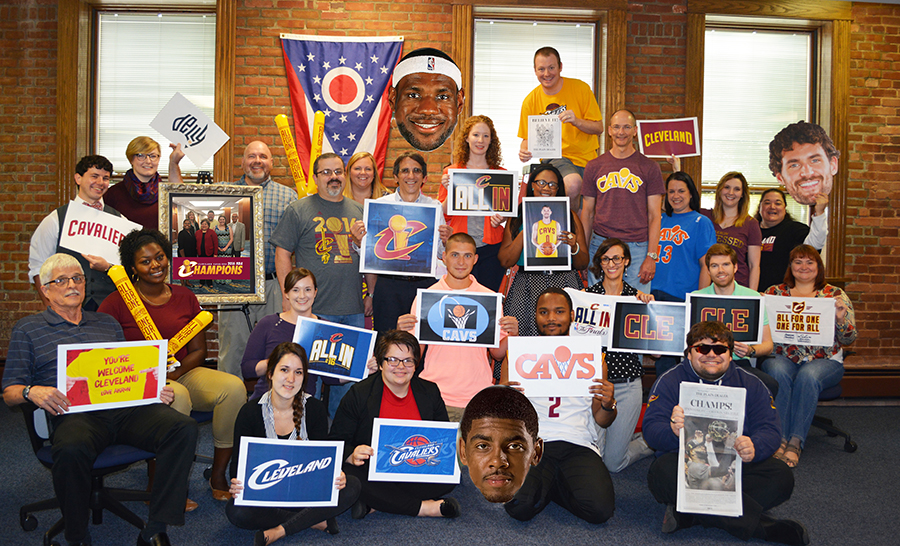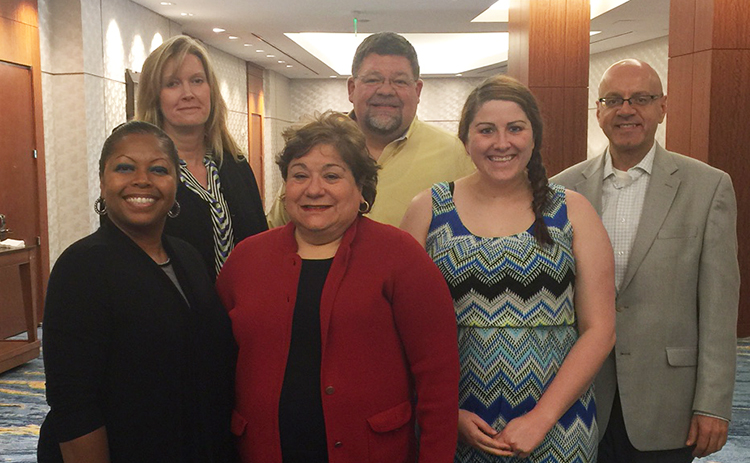We are celebrating #23
--
and it is not about
LeBron James
I just
returned from the U.S.
Chamber Small Business
Summit in DC. I have
been a regular attendee
for a number of years. I
refer to it as my own
personal professional
development session.
Why?
Because on July 1, State
and Federal
Communications
celebrates its 23rd
anniversary of being in
business. We are
considered as one of the
companies in NE Ohio
providing good
professional jobs to the
community.
I write
about our anniversary
every July. It is
important not only for
us, but for you, our
clients, who keep us
motivated every day to
continue to bring you
updated information
about lobbying,
political contributions,
and procurement issues
in the states and now
more than 285
municipalities.
We will never
stop growing to help meet
your needs.
-
We
introduced our
FedALERTS interface
last year to help
with the filing of
LD-2 and LD-203
reports. If you are
interested, please
let me know. Our
pricing is very
affordable and based
on a small
percentage of what
is reported in a
year.
-
We
have completed our
third update to the
“User’s Guide to
National Party
Conventions.”
In fact, if you go
to this link, you
can download a copy
for you and your
team. And, if you
want to hear good
reporting from the
conventions, follow
www.WKSU.org,
our local NPR
affiliate, because
State and Federal
Communications is
sponsoring
convention coverage
in Cleveland and
Philadelphia.
-
And,
we are growing. We
have increased the
staff in our
Research Department
so we can continue
doing the work we do
so well…and start
reviewing the
countries in the
European Union to
determine if there
is enough to start
including
international
lobbying on our
website. Are you
interested? Let me
know.
I know it
takes someone with
determination to operate
a company. I know it
takes blood, sweat, and
tears to make sure we
are providing good
benefits for everyone on
the staff.
We will
continue to be here to
help you with your
lobbying, political
contributions, and
procurement needs…And,
if we you have any
questions, just give us
a call.
So, we
are celebrating #23 just
as our own LeBron James
#23 for the Cleveland
Cavaliers is celebrating
winning the NBA Finals.
WIN/WIN is what it is
all about here in Ohio.
Enjoy the
upcoming holiday
weekend, and we will see
you next month.
|
Elizabeth Z. Bartz
President and CEO
@elizabethbartz
|
|
|
|
 
Virginia Governor Approves Changes
to Ethics Laws
Kevin Newman, Esq.,
Research
Associate
For the third year in a row, Virginia lawmakers
approved changes to the state’s ethics laws. In May, Gov. Terry
McAuliffe signed Senate Bill 692, affecting lobbyist reporting
requirements, the State and Local Government Conflict of Interest
Act, and the General Assembly Conflicts of Interests Act.
The bill reduces the required number of lobbyist
reports to a single annual report. Due July 1, the report covers the
period of May 1 to April 30. The December 15, 2016, report is not
required, with the next report due on July 1, 2017. A notification
must be sent by December 15, beginning this year, for the period of
December 1 of the previous year to November 30.
Previously, items valued at $50 or less did not need
reported. Senate Bill 692 lowers the reporting threshold to items
with a value of $20 or more. Principals are no longer required to
report the name of an official or of a family member of an official
who attended a reportable entertainment event if the official
reimburses the principal or otherwise pays for his or her attendance
at the event. Further guidance as to what must be included on
lobbyists reports will be issued by the Virginia Conflict of
Interest and Ethics Advisory Council. Effective January 1, 2017, the
bill removes forms set out in the Virginia Code and directs the
council to create forms and issue instructions on how to comply with
disclosure requirements.
The General Assembly also made changes affecting who
has to register as a lobbyist. Last year, procurement transactions
were added to the definition of what constitutes executive action
for purposes of lobbying executive agencies. Senate Bill 692 amends
the definition of procurement transaction to exclude contracts with
the stated or expected value of less than $5 million. An emergency
clause in the bill made this change effective immediately upon
passage.
Finally, the bill amends definitions in the conflict
of interest acts. The definition of gift, with an already extensive
list of exclusions, now excludes gifts with a value of less than
$20. Both V.C. §2.2-3103.1 and V.C. §30-103.1 have pre-existing
provisions stating gifts below $20 are not subject to aggregation
for purposes of the gift limits. This amendment takes effect on July
1, 2016.
|
|

 Summary of Changes UPDATE Summary of Changes UPDATE
Note Recent Changes to
Compliance Regulations
Michael Beckett, Esq., Research
Manager
CUYAHOGA COUNTY, OHIO: County
Council recently updated the county’s code of ethics to clarify the
ethical rights, responsibilities, and prohibitions applicable to
elected officials, employees, board members, contractors, and
lobbyists. Changes include a new five percent lobbyist registration
threshold, a new lobbyist disclosure report due January 1, updated
gift rules with a presumption of influence standard, and a lower
monetary contract threshold for contractor registration and ethics
training. The ordinance became effective May 27.
ONTARIO, CANADA: Effective July
1, the Office of the Integrity Commissioner will begin enforcing a
new lobbying law for the province. In 2014, the Legislative Assembly
passed an omnibus bill with changes to the province’s Lobbyists
Registration Act, but the law is just now coming into force by
proclamation of the lieutenant governor. Schedule 8 of Bill 8, the
Public Sector and MPP Accountability and Transparency Act, 2014,
gives the Ontario integrity commissioner as lobbyist registrar new
investigative and enforcement power for violations. Individuals
found in violation can be prohibited from lobbying for up to two
years. Additional changes include a streamlined registration form
for certain companies, a lower registration threshold for in-house
lobbyists, and new questions on registration forms.
RHODE ISLAND: On June 13, Gov.
Gina Marie Raimondo signed two bills into law changing the state’s
lobbying laws. Senate Bill 2361 and House Bill 7388 both repeal the
current lobbying laws in Title 22 and Title 42 in the state’s
statutes and enact the Rhode Island Lobbying Reform Act. Among the
changes in the bills are the simplification of lobbyist reporting
requirements, an increase in penalties for failing to comply with
lobbying requirements, and the allowance for more investigative and
administrative authority for enforcing the lobbying laws, including
administrative subpoena power. The effective date for the two bills
is January 1, 2017.
TEXAS: The Texas Ethics
Commission adopted rule changes to conform with House Bill 3517 of
2015. The bill had removed the exemption for registration for an
individual who is solely paid to communicate in a capacity other
than as an employee of a vendor of a product or service to a member
of the executive branch concerning state agency purchasing decisions
involving a product, service, or service provider or negotiations
regarding such decisions if the compensation for the communication
is not totally or partially contingent on the outcome of any
administrative action. The Texas Ethics Commission Rules definition
of independent contractor under T.E.C.R. §34.1(5) has been repealed.
The Texas Ethics Commission Rules allowing for $75 registration for
certain independent contractors under T.E.C.R. §34.46 has also been
repealed. On May 3, the rule changes became effective.
TEXAS: Beginning June 22,
lobbyists in Texas are required to include previously excluded types
of compensation when reporting lobbyist activity. On June 1, the
Texas Ethics Commission adopted rules changing some regulations. One
regulation currently allows for compensation exceptions for purposes
of calculating the threshold requiring registration as a lobbyist.
Those same exceptions were also exempted from lobbyist activity
reporting. Effective June 22, those exceptions for calculating the
registration threshold remain, but registered lobbyists will now
have to report those types of compensation. Additionally, the Ethics
Commission enacted a rule narrowing the gift exemption for
permissible fact-finding trips provided to government officials and
employees by lobbyists.
|
|

Legislation We Are
Tracking
At any given time, more than 1,000
legislative bills, which can affect how you do business as a government
affairs professional, are being discussed in federal, state, and local
jurisdictions. These bills are summarized in State and Federal
Communications' digital encyclopedias for lobbying laws, political
contributions, and procurement lobbying and can be found in the client
portion of our website.
Summaries of major bills are also included
in monthly email updates sent to all clients. The chart below shows the
number of bills we are tracking in regard to lobbying laws, political
contributions, and procurement lobbying.
| |
Total bills |
Number of Jurisdictions |
Passed |
Died |
Carried over
to 2017 |
|
Lobbying Laws |
343 |
42 |
16 |
157 |
4 |
|
Political Contributions |
600 |
49 |
33 |
237 |
14 |
|
Procurement Lobbying |
342 |
43 |
22 |
109 |
0 |
|
|

Jurisdiction Added to our
Website
The number
of municipalities and regional governments our research
associates track continues to grow. We now cover almost
300 municipalities and local governments. This is part of a continuous effort to better serve the
needs of our clients.
In that
effort, we have added abridged jurisdictions to
our website. These entries, condensed due to the limited
number of relevant local laws, provide the core
information our clients need for their government
relations work.
The new jurisdiction is:
|
Pierce County, Washington |

 |
W E B S I T E
T I P
Every month subscribers to the State and Federal
Communications website receive the Summary of Changes,
which is a list of all of the changes and additions made
to the website in the course of the prior month. One of
the features of the Summary of Changes is the
Legislation Updates, found in the left-hand column of
the state updates. The legislation updates follow the
bills relevant to the particular publication from
introduction to final disposition. When the bills are
first listed in the Summary of Changes, a very brief
description of the bill is included. In subsequent
months the update will show the bill number and, in
parentheses, the month and year of the Summary of
Changes document that the bill was first listed,
followed by the current status of the bill. The bill
will continue to be listed until it is signed into law,
carries over to the next session, or dies. The full bill
text, along with the most recent updates, can be found
on each jurisdiction’s webpage titled “Legislative
Updates for 2016.” |
|
| |
|

ASK THE
EXPERTS
State and
Federal Communications’ Experts Answer Your Questions
2016 Party Conventions
Here
is your chance to “Ask the Experts” at State and Federal
Communications, Inc. Send your questions to
experts@stateandfed.com.
(Of course, we have always been available to answer
questions from clients that are specific to your needs, and
we encourage you to continue to call or email us with
questions about your particular company or organization. As
always, we will confidentially and directly provide answers
or information you need.) Our replies are not legal advice,
just our analysis of laws, rules, and regulations.
|
 |
In what ways are my company and I allowed to get
involved in the 2016 national party conventions? |
|
|
 |
 The
opportunities for individuals and companies to involve
themselves in this year’s party conventions are legion,
but caution must be exercised to avoid running afoul of
the many intersecting laws governing your interaction
with the delegates and other officials in attendance as
well as the committees putting on the conventions. The
opportunities for individuals and companies to involve
themselves in this year’s party conventions are legion,
but caution must be exercised to avoid running afoul of
the many intersecting laws governing your interaction
with the delegates and other officials in attendance as
well as the committees putting on the conventions.
Convention
delegates and those seeking selection as delegates are
subject to the federal contribution rules, which means
corporations, labor organizations, foreign nationals and
businesses, and federal contractors are not permitted to
make contributions. However, those permitted to
contribute may do so without limits. Delegates who are
public officials are subject to the gifts laws governing
the office they hold. In other words, federal officials
are subject to federal gift laws, state officials are
subject to state gift laws, and local officials are
subject to any state and local laws applicable to their
office.
Individuals
and organizations seeking to become involved with the
conventions may contribute to the convention host
committees. The host committees are nonprofit
organizations set up to encourage commerce in and
project a favorable image of the convention city.
Organizations and individuals may donate money and make
in-kind donations to the host committee to defray the
costs of the convention, including costs related to
promoting the city and welcoming attendees, providing
information and samples to attendees, administrative
expenses, providing the use of convention facilities,
transportation, law enforcement, hotel rooms,
accommodations and hospitality for party site selection
groups, and for other convention-related facilities and
services.
Convention
committees are related to the national party
organizations and therefore federal campaign finance
laws apply. As a result, direct and in-kind
contributions using funds from a corporation, labor
organization, foreign nations and businesses, and
federal contractors are prohibited. Goods and services
may be provided to the national committee in the
ordinary course of business. Obviously, it’s quite
important to distinguish the host committees from the
convention committees. Thankfully, both host committees,
the Cleveland 2016 Host Committee and the Philadelphia
2016 Host Committee, use the word "host" in their
official names.
The national
party conventions represent high profile ways to gain
exposure both personally and for your organization. This
high profile is also why compliance with the rules
governing your dealings with committees, delegates, and
attendees is so important.
John Cozine, Esq., Compliance Manager |
|
|

|
|
 |
|

State and Federal
Communications, Inc.
Celebrates
the 2016 NBA Champion Team
Cleveland Cavaliers!
 |
|

PAC Grassroots
Conference 2016 - Take 2

Attending the rescheduled 2016 PAC
Grassroots Conference was [front row] Gamble Hayden,
Elizabeth Z. Bartz, and Lisa Kot;
[back row] Rebecca Pixton South, Renold Koozer, and Joe
May.
|
| |
| |


Plan to say hello at future
events where State and Federal
Communications, Inc.
will be attending and/or
speaking regarding compliance issues. |
|
Events
|
July
14-17 |
NGA Summer Meeting, Des Moines, Iowa |
|
July
21 |
Akron Roundtable, Akron, Ohio |
|
July
26 |
WGR Toastmasters, Washington, DC |
|
August 8-11 |
NCSL Legislative Summit, Chicago,
Illinois |
|
August 18 |
Akron Roundtable, Akron, Ohio |
|
September 7-9 |
Practising Law Institute - Corporate
Political Activities, Washington, DC |
|
September 15 |
Akron Roundtable, Akron, Ohio |
|
November 19-22 |
SGAC Leaders' Policy Conference |
|
|
COMPLIANCE
NOW is published for our customers and friends.
Click here
to
SUBSCRIBE
or
click
here to UNSUBSCRIBE.
Click here to send us comments regarding
the COMPLIANCE NOW e-newsletter.
State and
Federal Communications, Inc. | Courtyard Square | 80 South
Summit St., Suite 100 | Akron, OH 44308 |
| 330-761-9960 |
330-761-9965-fax | 888-4-LAW-NOW|
http://www.stateandfed.com/

|
 |
The Mission of State
and Federal Communications is
to make sure that your
organization can say, "I Comply."
We are the leading
authority and exclusive information source
on
legislation and regulations surrounding campaign finance
and political contributions; state, federal, and
municipal lobbying; and procurement lobbying.
Contact us to learn how
conveniently our services will allow you to say "I
Comply" for your compliance activities.
http://www.stateandfed.com
|
www.stateandfed.com |
![]() View Full Print-Friendly Version
View Full Print-Friendly Version